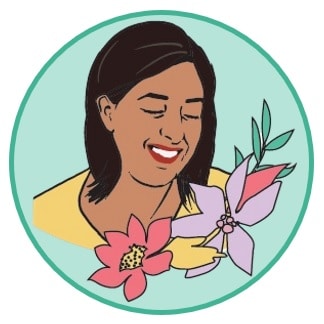What to know
This game is used in a group session to discuss women's opinions about cervical cancer screening and help them create an action plan.
Overview
This game is used in an AMIGAS group session to:
- Discuss women's feelings, opinions, and experiences with cervical cancer screening.
- Help women find ways to overcome the any challenges in getting screened regularly.
- Help women create an action plan.
Materials: Posters, personality cards, and the questions and answers shown below.
How to get ready
- Read the personality posters, cards, and questions and answers so that you are familiar with them.
- Separate the personality cards for Carolina, Ana, and Raquel into three separate stacks of cards.
How to play
- Show each of the three personality posters and read the statement that describes how the woman feels about getting screened. Ask the women to choose which friend they identify with.
- Work in teams based on the friend that each woman has identified with. For an in-person session, give each team the matching stack of personality cards. For a remote session, show the list of statements.
- Ask for a volunteer in each team to read the statement on the front of one of their personality cards (or one statement from the list). Have the team talk about the statement and what they would say to help Raquel, Ana, or Carolina with these concerns. Do this for each card or statement. If no one in the team can read, you should help them by reading the statements out loud.
- After the teams have discussed the statements for 5 to 7 minutes, bring the group back together. Ask each team to share one of their proposed responses with the whole group. There is not enough time to talk about all of the statements.
- Get feedback from the group about whether the responses provided would help Raquel, Ana, or Carolina get screened.
- Use the answers below when needed to help the group understand how best to help Raquel, Ana, or Carolina get screened.
Things to remember
- When you lead the discussion at the end of the game, keep in mind that the goal for the group is to think of ways to move the "friend" closer to getting screened.
- If you wish, you could ask all of the participants in your session to choose one "friend" to talk about together, instead of forming teams.
Questions and answers
Raquel

Raquel: I can't go to the doctor. I have to look after my grandchildren.
Many women find that getting a screening test is hard when they have children to take care of. Some clinics have child care available. Some of us have a friend or neighbor look after the children while we go to the doctor.
Raquel: My daughter wants me to get a screening test, but I am afraid. I have never been to a doctor in this country.
Many women feel afraid to get a screening test, especially when they are going for the first time. It can help when you know what is going to happen. I can give you some information that explains the process. The clinic staff can also answer any questions you have. Perhaps your daughter might be willing to go with you. It helps when we take a friend or family member with us.
Raquel: I don't think I will understand or be able to trust the results of a screening test.
Many women worry about the results. The screening tests are something doctors do all the time, and they are trained. We can trust the results we are given. It's OK to ask questions. They will explain the results to you. Perhaps your daughter will help you, too.
Raquel: I don't have a regular income, legal immigration status, or health insurance. I can't afford to go to the doctor.
The cost of the test is a problem for many of us. Some clinics give screening tests even if you don't have insurance or papers. Some clinics have free tests. Some clinics have low-cost tests and payment plans. I'll give you information about those clinics.
Raquel: I don't understand why I need a screening test now that I am a widow and not sexually active.
Even when we are older or no longer having sex, we may still need to get screened for cervical cancer.
Ana

Ana: I don't speak English very well. I'm worried that I won't be able to talk to the doctor.
Many clinics have staff who speak Spanish. When you make your appointment, you can tell them you need to see someone who speaks Spanish.
Ana: I think I had a Pap test years ago. I remember that it was painful.
Sometimes the test can be a little painful. It's not usually very bad and is over quickly.
Ana: I don't understand why I need another test, since the results were normal last time.
Getting a test once is not enough. We must get them regularly. This helps to make sure that we stay healthy.
Ana: My husband doesn't like the idea of me having a screening test, but we both know that it can help prevent cervical cancer.
It's good that you both understand the importance of getting a screening test. Sometimes husbands don't really like the idea of their wives getting these tests. It's important that we do it anyway, for our own health. Perhaps your husband will feel better if he knows more about it. I can give you some information to share with him.
Ana: I'm not sure why I need to be screened for cervical cancer when I'm not feeling sick.
It can be hard to understand why we need a screening test when we are well. Cervical cancer often has no symptoms. Having a test makes sure that we stay healthy.
Carolina

Carolina: I had a Pap test many years ago but haven't had one for a long time.
It's good that you had a Pap test some years ago. But it's also important that we get screened regularly to make sure that we are still healthy. Having a test once is not enough. It's an ongoing process.
Carolina: I'm very busy, but I know that taking care of my health is important.
Many of us find it hard to make time for screening tests. But we must! It's good that you know how important it is to take care of your health. That should include making time for cervical cancer screening.
Carolina: Getting these screening tests is embarrassing.
Yes, many women are embarrassed about getting these tests. It does not take long. The clinic staff are used to seeing women's bodies every day. It is worth being embarrassed for a few minutes to know you are healthy.
Carolina: I don't drive, and I don't have transportation to the clinic.
Getting to the clinic is often hard. Some clinics are easy to get to by bus. Some clinics offer transportation services. I can give you this information for the clinics in your area. In addition, you might be able to get a ride with a friend or relative.
Carolina: Having a screening test isn't fun, and I really don't want to go alone.
You are right that having these tests isn't fun. Perhaps you could take a friend with you to the clinic. Many women do this as it makes them feel better than going for their screening test alone.
